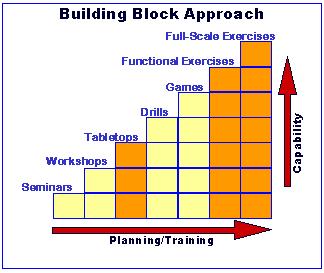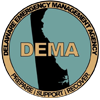DEMA Multi-Year Exercise Program
The mission of the Training and Exercise Section is to prepare Delaware Emergency Management Agency (DEMA) and Delaware’s all-hazard response community by providing training, conducting exercises, and coordinating Delaware’s National Incident Management System (NIMS) compliance to save lives, protect Delaware’s economic base and reduce the impact of emergencies.
The U.S. Department of Homeland Security (DHS) Preparedness Directorate’s Office of Grants and Training (G&T) requires every State and urban area conduct a Multi-Year Training and Exercise Plan Workshop (TEPW) annually. As a result, the State of Delaware conducts a multi-year TEPW and produces a Multi-Year Training and Exercise Plan (TEP). The State of Delaware Multi-Year TEP is the roadmap for the State to accomplish the priorities described in their Homeland Security Strategy.
The State of Delaware has pursued a coordinated homeland security strategy that combines enhanced planning, new equipment purchases, innovative training, and realistic exercises to strengthen the State’s emergency prevention and response capabilities. Training and exercises play a crucial role in this strategy by providing the State with a means of attaining, practicing, validating, and improving new capabilities. The State’s training and exercise programs are administered by the Delaware Emergency Management Agency (DEMA) in coordination with local emergency response agencies.
Delaware executes the exercise program under the Homeland Security Exercise and Evaluation Program (HSEEP) process using a Building-Block Approach using a cycle of increasingly complex exercises and building upon lessons learned from previous training and exercises.
Exercise Types
There are seven types of exercises defined within HSEEP, each of which is either discussion-based or operations-based.
Discussion Based Exercises
Discussion-based Exercises familiarize participants with current plans, policies, agreements and procedures, or may be used to develop new plans, policies, agreements, and procedures.Types of Discussion-based Exercises include:
- Seminar - A seminar is an informal discussion, designed to orient participants to new or updated plans, policies, or procedures (e.g., a seminar to review a new Evacuation Standard Operating Procedure).
- Workshop - A workshop resembles a seminar, but is employed to build specific products, such as a draft plan or policy (e.g., a Training and Exercise Plan Workshop is used to develop a Multi-year Training and Exercise Plan).
- Tabletop Exercise (TTX) - A tabletop exercise involves key personnel discussing simulated scenarios in an informal setting. TTXs can be used to assess plans, policies, and procedures.
- Game - A game is a simulation of operations that often involves two or more teams, usually in a competitive environment, using rules, data, and procedure designed to depict an actual or assumed real-life situation.
Operations Based Exercises
Operations Based Exercises validate plans, policies, agreements and procedures, clarify roles and responsibilities, and identify resource gaps in an operational environment. Types of Operations-based Exercises include:
- Drill - A drill is a coordinated, supervised activity usually employed to test a single, specific operation or function within a single entity (e.g., a fire department conducts a decontamination drill).
- Functional Exercise (FE) - A functional exercise examines and/or validates the coordination, command, and control between various multi-agency coordination centers (e.g., emergency operation center, joint field office, etc.). A functional exercise does not involve any "boots on the ground" (i.e., first responders or emergency officials responding to an incident in real time).
- Full - Scale Exercise (FSE)- A full-scale exercise is a multi-agency, multi-jurisdictional, multi-discipline exercise involving functional (e.g., joint field office, emergency operation centers, etc.) and "boots on the ground" response (e.g., firefighters decontaminating mock victims).
Building-Block Approach
The State of Delaware’s jurisdictions possess different levels of preparedness regarding the all hazards approach and terrorism prevention, response, and recovery capabilities. Because of these differences, the Delaware Exercise Plan utilizes a building-block approach in the design of the overall exercise program.
In accordance with the HSEEP guidance, the building-block approach ensures successful progression in exercise design, complexity, and execution, and allows for the appropriate training and preparation to occur in the community receiving the exercise. Using this methodology, Delaware can ensure that the levels of exercise scope, scale, and complexity are tailored to each specific region or jurisdiction within the State, while maintaining a consistent statewide delivery method.

Determining the appropriate exercise baseline is essential to the development of a successful exercise program. Using the building block approach and the cycle of complexity enhances the likelihood for success. The program allows for a logical progression of regional and jurisdictional preparedness by increasing the size, complexity, and stress factor over time, while allowing for significant learning opportunities that complement, build upon, and directly lead into one another effectively. This model remains flexible enough to allow for the addition, or inclusion, of other desired exercise types that the State or jurisdictions may require.
The initiating act(s) of terrorism may vary in the statewide exercise process, and as the timeline moves forward, exercises can be developed to reflect increased levels of complexity to more fully understand the elements involved in prevention, response, and recovery. Finally, this exercise model allows for a cyclical approach to statewide exercises, and a sustainable program for achieving higher degrees of overall preparedness for acts of terrorism.
For more information or to register for WMD training email us at: DEMA Training








